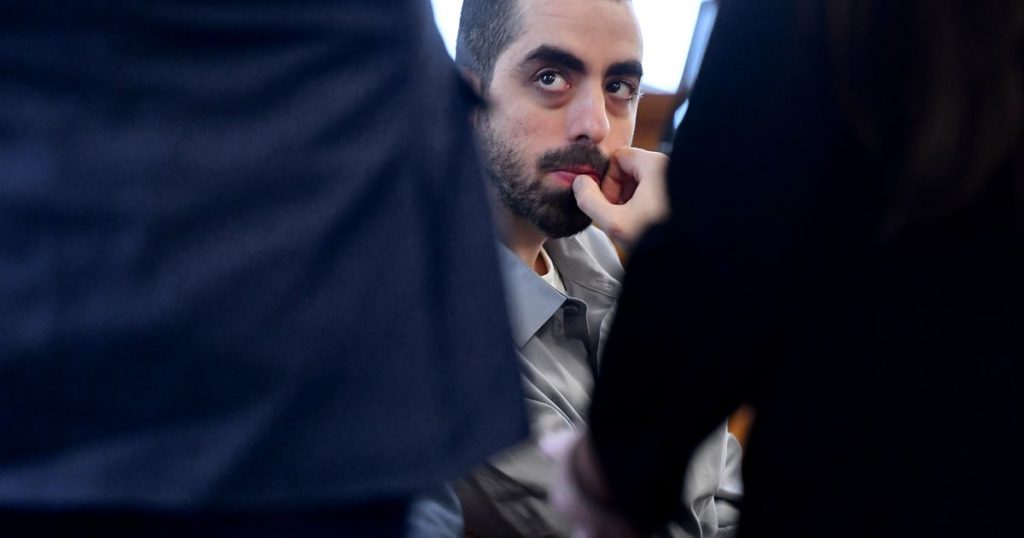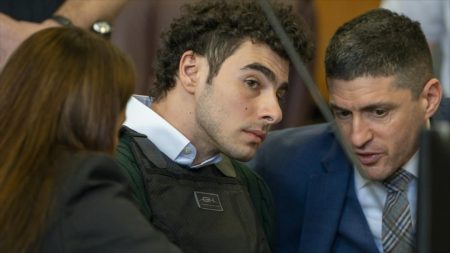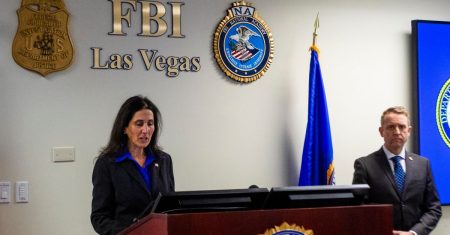The Violent Attack on Salman Rushdie: A Shocking Act of Violence on a Global Stage
On August 12, 2022, the world watched in horror as renowned author Salman Rushdie was brutally stabbed multiple times on a lecture stage at the Chautauqua Institution in New York. The attacker, Hadi Matar, a 27-year-old man from New Jersey, carried out the assault in front of a live audience, leaving the 77-year-old author with life-threatening injuries. The attack, which lasted mere minutes, would have far-reaching consequences for Rushdie, Matar, and the global literary community. The incident underscored the enduring tensions between free expression and extremism, as well as the fragility of human life in the face of violence.
The attack occurred just moments before Rushdie was set to deliver a lecture on the importance of protecting writers at risk. Matar, who had been in the audience, suddenly ran onto the stage, armed with knives, and began stabbing Rushdie more than a dozen times in the neck, face, and torso. The assault was so violent that Rushdie later described it as a moment when he believed he was going to die. Bystanders and security personnel quickly intervened, subduing Matar and rushing Rushdie to a nearby hospital for emergency treatment. Henry Reese, the co-founder of City of Asylum Pittsburgh, who was also on stage with Rushdie, suffered a gash to his forehead during the chaos. The attack sent shockwaves around the world, with many expressing outrage and solidarity with Rushdie, who has long been a target of threats due to his writings, particularly his controversial novel The Satanic Verses.
The Trial and Conviction of Hadi Matar: A Swift and Decisive Legal Process
The trial of Hadi Matar began in Chautauqua County Court, with District Attorney Jason Schmidt leading the prosecution. The trial lasted for seven days, during which Rushdie himself took the stand to describe the traumatic events and the long, painful recovery that followed. The prosecution presented a wealth of evidence, including graphic video footage of the attack, witness testimony, and medical records detailing the severity of Rushdie’s injuries. The jury, comprising members of the local community, was tasked with determining whether Matar was guilty of attempted murder and assault.
In his closing argument, District Attorney Schmidt emphasized the deliberate and premeditated nature of the attack. He played a slow-motion video of the assault for the jury, pointing out how Matar had methodically made his way to the stage and targeted Rushdie with precision. Schmidt argued that the violence was not only unprovoked but also explicitly intended to kill. He highlighted the fact that Rushdie’s injuries could have been fatal without immediate medical intervention, citing testimony from a trauma surgeon who described the extensive damage to Rushdie’s body. On the other hand, Matar’s defense team, led by Assistant Public Defender Andrew Brautigan, argued that the prosecution had not proven beyond a reasonable doubt that Matar had explicitly intended to kill Rushdie. They characterized the attack as a chaotic outburst and suggested that Matar’s actions, while violent, did not necessarily demonstrate a conscious intent to murder.
The jury, however, sided with the prosecution. After less than two hours of deliberation, they delivered a guilty verdict on both charges: attempted murder and assault. Matar was found responsible for the near-fatal attack on Rushdie and the injuries sustained by Henry Reese. The verdict marked a significant moment in the case, bringing a measure of justice to the victims and their families.
Salman Rushdie’s Recovery: A Testament to Resilience and Strength
The physical and emotional toll of the attack on Salman Rushdie was immense. The author spent 17 days in a Pennsylvania hospital and several weeks in a New York City rehabilitation center, undergoing multiple surgeries and confronting a long and arduous recovery. The stabbing left him blind in one eye, a permanent reminder of the violence he endured. Despite the severity of his injuries, Rushdie demonstrated remarkable resilience. During his testimony, he openly discussed the trauma he experienced, including the moments when he believed his life was slipping away. He also shared details about his ongoing rehabilitation, which included learning to adapt to his new physical limitations.
Rushdie’s recovery was not only physical but also emotional. The attack forced him to confront the fragility of life and the enduring impact of the decades-long threats he had faced due to his work. In his 2024 memoir, Knife, Rushdie reflects on the attack and its aftermath, offering a deeply personal account of his experiences. The book serves as a testament to his strength and determination, as well as his unwavering commitment to free expression. Through his words, Rushdie continues to inspire readers and writers around the world, reminding them of the power of literature to challenge, provoke, and uplift.
The Legal Implications and Sentencing: Justice and Accountability
With the guilty verdict delivered, the next step in the legal process is sentencing. Hadi Matar faces up to 25 years in prison for the attempted murder of Salman Rushdie, as well as additional charges for the assault on Henry Reese. Judge Sandra M. Lfixed has set the sentencing date for April 23, 2024, during which she will hear arguments from both the prosecution and the defense before making her decision. The prosecution is expected to push for the maximum sentence, emphasizing the severity of the attack and the long-term impact it has had on Rushdie’s life. The defense, on the other hand, may argue for leniency, potentially citing mitigating factors such as Matar’s mental state or background.
The case has also drawn attention to broader legal and societal issues, particularly the intersection of free speech and violence. Many have questioned how Matar was able to carry out the attack, given the security measures in place at the Chautauqua Institution. Others have highlighted the ongoing challenges faced by writers and public figures who become targets of extremism. The trial and its outcome serve as a reminder of the importance of accountability and the need to protect individuals who face threats due to their work or beliefs.
The Motivation Behind the Attack: A Legacy of Controversy and Extremism
The attack on Salman Rushdie was not an isolated incident but rather the latest chapter in a decades-long saga of threats and violence sparked by his writing. In 1989, Rushdie’s novel The Satanic Verses was published, leading to widespread outrage in some Muslim communities, who deemed the book blasphemous. Iran’s Supreme Leader, Ayatollah Ruhollah Khomeini, issued a fatwa, or edict, calling for Rushdie’s death. This fatwa placed Rushdie in hiding for years and forced him to live under constant surveillance. Although the Iranian government later distanced itself from the fatwa, the threat it posed never entirely disappeared.
Hadi Matar’s motivations for the attack appear to be deeply tied to this legacy of extremism. A federal indictment alleges that Matar was inspired by a 2006 speech in which a Hezbollah leader endorsed the decades-old fatwa. Matar, who had reportedly become radicalized online, saw himself as an enforcer of the edict. The attack was not only a personal vendetta but also a political statement, aimed at silencing a voice that had been deemed offensive by certain groups. This broader context adds a layer of complexity to the case, raising questions about the role of ideology, radicalization, and global extremism in shaping violent acts.
Conclusion: A Call to Action for Free Expression and Human Rights
The attack on Salman Rushdie serves as a stark reminder of the dangers faced by writers, artists, and thinkers who challenge societal norms or religious dogma. While the guilty verdict and impending sentencing of Hadi Matar provide a measure of justice, they also highlight the ongoing threats to free expression and human rights. Rushdie’s case is not unique; countless others around the world face similar threats for their work.
As the global community reflects on this incident, it is important to reaffirm the importance of protecting free expression and standing against extremism. The attack on Rushdie was not just an attack on one man; it was an assault on the principles of open dialogue, creative freedom, and human dignity. By supporting writers at risk and advocating for their safety, we honor the spirit of Salman Rushdie and the countless others who have been targeted for their courage to speak truth to power.
In the words of Rushdie himself, the attack on his life has only strengthened his resolve to continue writing and challenging the status quo. His resilience is a testament to the enduring power of literature and the human spirit. As he navigates the next chapter of his life, Rushdie remains a beacon of hope for all those who believe in the transformative power of words.















